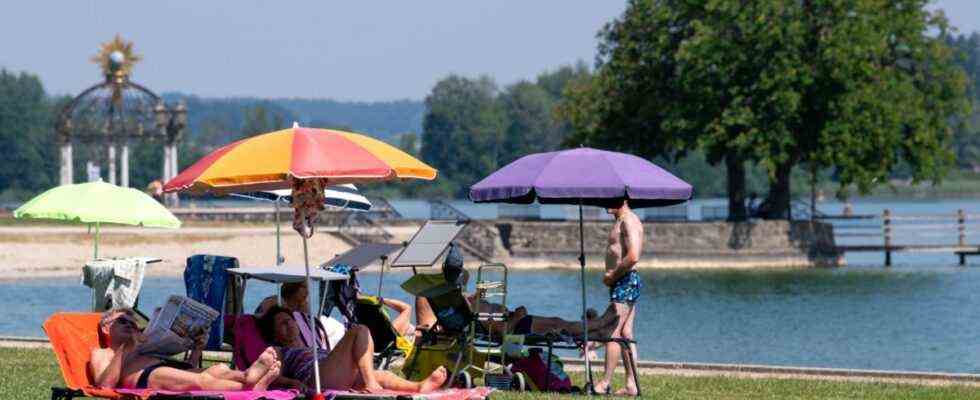June was the first full month of this year in which the hotels and restaurants in Bavaria were allowed to open again. The start was eagerly awaited in the industry. Nevertheless: The tourism industry can currently only dream of numbers like before the pandemic. “The bookings are okay, but cancellations and uncertainties are still a big issue,” says Magnus Wanner, managing director of the Allgäuer Landhotel Panorama. Wanners Hotel is one of over 44,000 hotels and restaurants in Bavaria.
Wanner expects good occupancy rates for the summer holidays. But he looks to the time after the summer with skepticism. “We are looking ahead to autumn with great concern,” says the 30-year-old. He no longer believes that he will be able to leave his hotel open in the autumn. The fact that the number of infections is rising again in some regions of Europe gives him a foretaste of what could also threaten Bavaria. “It will be the same game as last year,” he fears with a view to possible closings.
The tourism industry in Bodenmais is doing similarly. The bookings for hotels, guest houses and bathing and sauna parks give hope for good summer business, but it is important that “there is no further lockdown,” says Tobias Wolf, who is responsible for tourism marketing in Bodenmais. A lockdown in autumn would also be “catastrophic” for the Hotel Weißes Lamm in the Nürnberger Land, says Andrea Wagner. Especially since operations are starting up “a little more hesitantly” than last year at this time. Wagner explains this with long-distance travel that is possible again.
In Upper Bavaria, Munich and other cities in particular suffered severe sales losses due to the pandemic. Munich alone is struggling with a decrease of 60 percent in overnight stays. Last summer, the occupancy rate was only 40 percent – in previous years the rate was 70 percent.
According to the Upper Bavarian Tourist Association, this is mainly due to the lack of international guests and business trips, which made up a high proportion of overnight stays before the pandemic: “Since the overseas market has collapsed and is taking longer to recover, Munich will also recover first do not recover from the crisis so quickly, “says the Upper Bavaria Tourism Association. Nevertheless, the development shows a positive trend: “The demand is there.” An increasing influx is particularly noticeable in rural regions.
The industry is also confident when it comes to city tourism. Clemens Baumgärtner, advisor for work and economy of the city of Munich, assumes that the desire for city trips will not diminish: “People want to be with people and experience a very dense program in a strange place in a short time” – and “that only the cities offer “.
The industry association looks back on June rather cautiously. The first month after the lockdown was rather poor for the hosting industry from a financial point of view, says Thomas Geppert, Managing Director of the Bavarian Hotel and Restaurant Association (Dehoga). “Sales for June fell 32 percent this year compared to 2019.” In 2020, overnight stays in Bavaria fell from around 101 million to only around 60 million. This year, the industry is particularly suffering from the lack of guests in the conference hotel industry. In addition to the financial worries of the hoteliers in Bavaria, there is a lack of staff, in the lockdown mainly temporary workers and mini-jobbers migrated to other industries, says Geppert.
“Right now, when the hotels and restaurants have even more work due to the hygiene requirements, there is a shortage of employees.” If the number of cases rises again in autumn, the hotels and restaurants should “under no circumstances be closed again”. Dehoga has formulated a catalog of measures, the association is calling for a long-term opening plan from the state government. They want a “clear commitment that unilateral hospitality closings will also be ruled out in autumn”.
The operators of the Bayerische Zugspitzbahn in Garmisch-Partenkirchen also hope so. “The windows of the cabins are open on all trips, so the ventilation works perfectly,” says spokeswoman Verena Altenhofen. The rush at the Zugspitzbahn is manageable. You can feel that many Germans are spending their holidays abroad this year, unlike in 2020. “There have been days in the last few years when we had to temporarily stop ticket sales. We’re a long way from that at the moment.”
Bayerische Seenschifffahrt is reluctant to start up again. With more than 30 ships, it is one of the largest inland shipping routes in Germany. The guests are there, but they “prefer to go cycling or hiking,” says Marcus Weisbecker from Bayerische Seenschifffahrt. This development can be observed in all large Upper Bavarian lakes. For Weisbecker, 2021 is therefore a “year of transition”.
He looks hopefully to 2022. But he also knows that sea shipping as a leisure service is dependent on the future development of the pandemic. Other leisure businesses, on the other hand, are slowly returning to their previous visitor numbers. The summer toboggan and chairlifts on Blomberg near Bad Tölz are currently well attended, says managing director Hans Zintel. Families in particular take advantage of the offer. “People are grateful and happy that we are open again,” says Zintel.
The Bavarian locks are finally allowed to unlock again. According to spokeswoman Ines Holzmüller, “all tours are fully booked for July”. The most famous castle in Bavaria will not return to old visitor numbers this year. Normally up to one and a half million people visit Neuschwanstein Castle every year – last year it was just 290,240.

